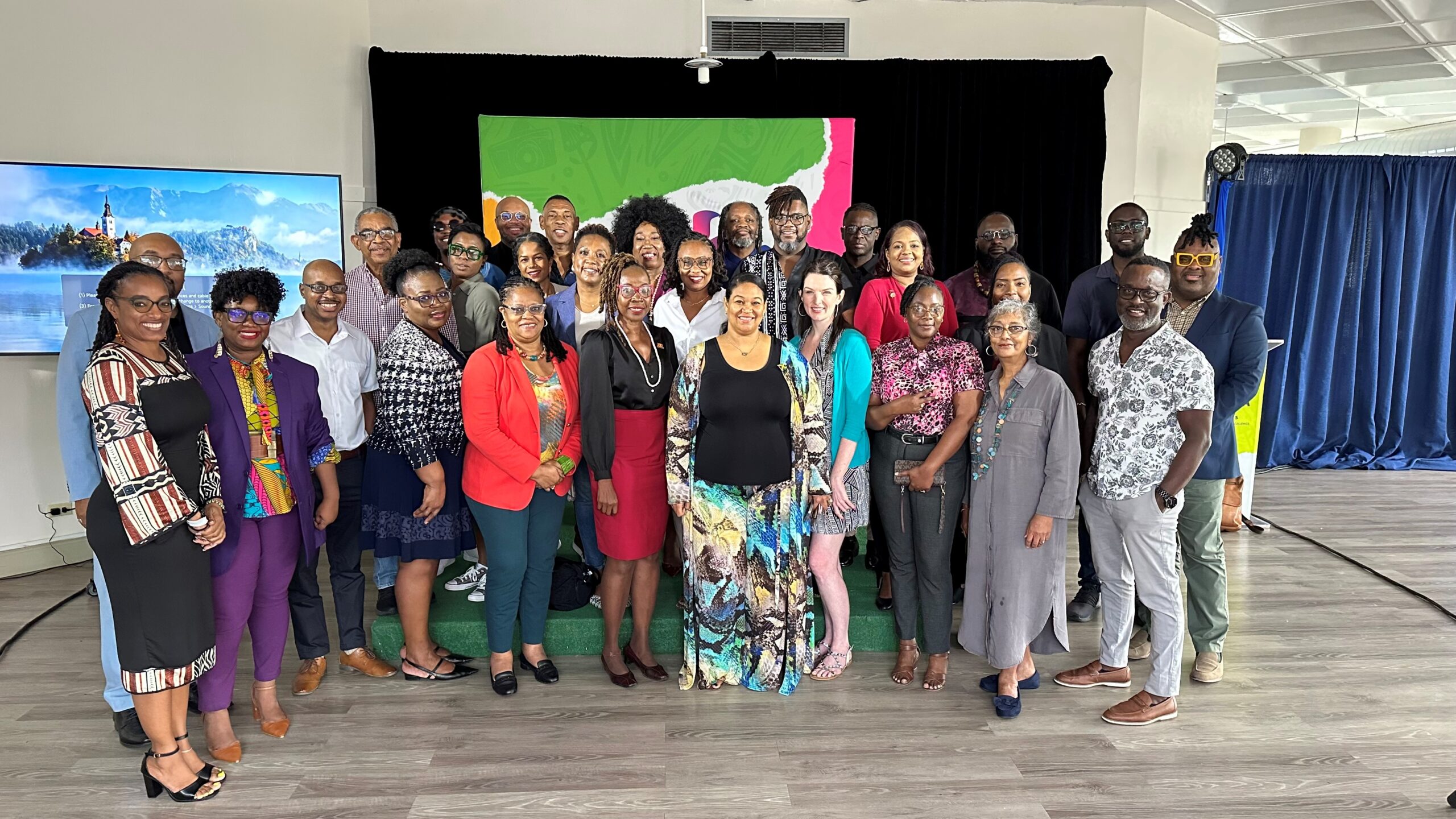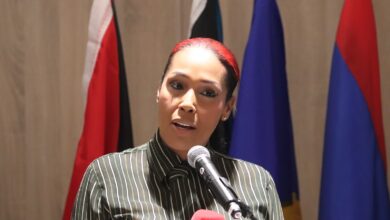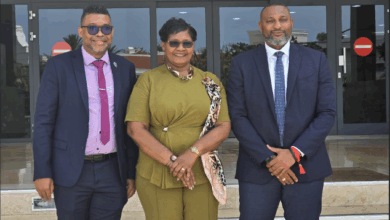“Ultimately, CARIFESTA XV presents the opportunity to stimulate the local economy through increased tourism, job creation, and support for small businesses. This festival sees the coming together of hundreds of cultural practitioners, as well as members of the wider populace to network, perform, trade in cultural goods and services and witness a diverse offering of performances, exhibitions and interactive experiences.” – Michelle Maynard, Deputy Permanent Secretary, Division of Culture, Barbados.
The Region’s hosting of CARIFESTA XV must reflect its theme: “Caribbean Roots. Global Excellence.” This is the call to action from the Regional Cultural Committee (RCC) during the Thirty-First Meeting of the body held at the Lloyd Erskine Sandiford Centre in Bridgetown, Barbados, from 26 – 27 July.
Representing the Government of Barbados at the opening of the RCC, Michelle Maynard, Deputy Permanent Secretary, Division of Culture in the Prime Minister’s Office, explained that CARIFESTA XV aims to highlight the rich cultural heritage as a bridge between human values and economic growth while positioning the Caribbean as a leader in cultural diplomacy and sustainable development.
“Ultimately, CARIFESTA XV presents the opportunity to stimulate the local economy through increased tourism, job creation, and support for small businesses. This festival sees the coming together of hundreds of cultural practitioners, as well as members of the wider populace to network, perform, trade in cultural goods and services and witness a diverse offering of performances, exhibitions and interactive experiences,” stated the DPS.
In her remarks, Beverly Harry-Emmanuel, Advisor, Social Development at the CARICOM Secretariat, underscored that there is now a significant increase in regional and global awareness of the value and importance of the creative industries, and how they can contribute to sustainable development in small countries in the global South.
“These countries are recognised internationally for the excellence, richness and diversity of their cultural expressions,” stated the CARICOM Secretariat Advisor.
She added, “Directors of Culture have advocated for greater attention to and allocation of resources to the creative sector, resulting in significant changes in the enabling environment in the Region in terms of cultural policy, data collection, training, legislation and funding mechanisms at national and regional levels.”
During her remarks, Dr Hilary Brown, Programme Manager, Culture and Community Development at the CARICOM Secretariat, reflected on the birth of the Festival, which, has been held 14 times in eight countries over the past five decades.
“The Festival has had great success in terms of entertainment value and in creating a forum for sharing and exchange among the Region’s artists,” stated Dr Brown.
She also highlighted that over its 50-year history, CARIFESTA has raised public awareness of the value and importance of artists and the arts and has contributed to the process of cultural and regional integration by strengthening perceptions of Caribbean unity and identity.
Festival Director Carol Roberts (CEO, National Cultural Foundation, Barbados) underscored that CARIFESTA XV is happening during difficult times but assured the RCC that the organising committee is inspired by the resilience, determination, and creativity of Caribbean artists.
“We are not daunted,” stated the Festival Director. “CARIFESTA is the truest expression of our collective creativity, heritage and culture. It is precious, sacred and world-class. It serves as that powerful lens through which we can celebrate and examine our world and our place in it.
She emphasised that beyond the cultural performances and entertainment, CARIFESTA offers the Region the unique opportunity for Member States to reflect on current challenges and how the Region can be transformed through sustainability.
“CARIFESTA XV is about new technologies, the pros and cons of using them…and how we can utilise these innovations to take our art and culture to the furthest reaches of the world,” stated the Festival Director.
She added, “CARIFESTA is about youth and the kind of Region that we want our young people to inherit.”
The RCC has been instrumental in shaping cultural policy at the national and regional levels by advising Ministers of Culture on the many issues on the Region’s agenda and infusing the regional culture programme with new ideas, approaches and attitudes.
Editor’s Notes:
The RCC:
Was instrumental in the development of a Regional Cultural Policy which was completed in 1994 and which still serves as a reference document and a model for cultural policies in some Member States where policies are still being developed.
Was at the forefront for the restructuring of the Caribbean Festival of Arts -CARIFESTA, which led to the development of a Strategic Plan for the Festival in 2004; the establishment of an Interim Festival Directorate in 2006 and the phased introduction of the main elements of the new CARIFESTA model that emphasizes sustainability, more professional development opportunities for artists and better promotion of the event.The advocacy of the RCC contributed to greater understanding and attention being paid by governments in the Region to the need to develop the cultural and creative industries in CARICOM. The RCC has consistently highlighted and demonstrated the tremendous untapped potential of these industries, which are based on the creative genius and talents of the people of the Region. The RCC was also instrumental in guiding the work of the Regional Task Force on Cultural Industries that produced the Regional Strategy for the Cultural Industries in CARICOM between 2008 to 2012.
Has also been actively engaged in advising on issues of Culture, Trade and the CARICOM Single Market and Economy (CSME) over the past decade. Directors of Culture have reviewed and advised on issues related to the Free Movement of Artists under the CSME, addressing the definition of “artist;” calling for a revision of the terminology “artistes and musicians” in the Revised Treaty of Chaguaramas to “artists and cultural workers” as more inclusive terminology; and highlighting anomalies such as the fact that artists were free to move, but their tools of trade or tools of art were not free to move with them due to customs barriers.
Also provided advice during the negotiations of the Cultural Protocol III which forms part of the Economic Partnership Agreement and provided similar advice in the negotiation of the culture provisions under the CARICOM Canada Trade and Development Agreement.
Has highlighted the need for greater attention to issues such as culture in education; the need for better infrastructure to present and teach the arts in Member States; for cultural heritage preservation and development; intellectual property management; and has provided oversight of several regional projects that were implemented with funding from the European Development Fund, UNIDO, UNESCO and the Hub and Spokes Trade Project.
About CARIFESTA
CARIFESTA is an international multicultural event organised on a periodic basis by countries of the Caribbean. The last festival, CARIFESTA XV, was hosted in Trinidad and Tobago in 2019, under the theme “Connect, Share Invest.”
Read more about CARIFESTA: https://www.carifesta.net/about






